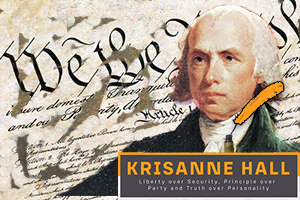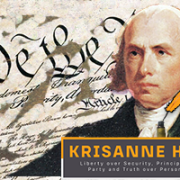General Welfare Clause – James Madison’s Warning: Its not about Money
General Welfare Clause – James Madison’s Warning: Its not about Money
By KrisAnne Hall, JD
Article 1 section 8 clause 1 of the Constitution reads:
“The Congress shall have Power To lay and collect Taxes, Duties, Imposts and Excises, to pay the Debts and provide for the common Defence and general Welfare of the United States…”
From this clause, many have construed the “general Welfare” statement to grant practically unlimited power to Congress to collect and spend the tax payers’ money on whatever cause Congress may invent for the “good” of the government or the people. Is that what the designers of our Constitution intended when they penned those words “general Welfare?”

James Madison, the Father of the Constitution and 4th President suggests that the meaning of the “general Welfare” clause is the exact opposite.
According to the father of the Constitution the powers delegated to the central government “are few and defined and those that remain in the States are numerous and indefinite.” Federalist #45.
Madison also explained that those powers are “reserved to external objects” of “war, peace, negotiation, and foreign commerce.” He also stated that the central government’s power to tax is intended to be limited to those powers. Federalist #45
In 1792, while serving as a representative to the people of Virginia, Madison made the true meaning of this often abused “general welfare clause,” during a debate on The Cod Fishery Bill. Madison begins by reminding the representatives of what he explained in Federalist #45:
“I sir have always conceived—I believe those who proposed the Constitution conceived—it is still more fully known and more material to observe, that those who ratified the Constitution conceived—that this not an indefinite government…but a limited government tied down to the specific powers.”
Madison knew during the ratification of this Constitution, much discussion was heard on the meaning of the “general welfare” clause, as some delegates were concerned that this clause would offer too much power to the federal government. During the Virginia Ratification Debates, Edmund Randolph explained to Patrick Henry, that the “general welfare clause” did not equate to general powers:
“But in the general Constitution, its powers are enumerated. Is it not, then, fairly deducible, that it has no power but what is expressly given it? – for if its powers were to be general, an enumeration would be needless…But the rhetoric of the gentleman has highly colored the dangers of giving the general government an indefinite power of providing for the general welfare. I contend that no such power is given.” [emphasis mine]
As Madison also reminds the House, this very specific and limited meaning of the “general welfare clause” was the accepted meaning by those who ratified the Constitution. Then Madison continues in 1792, to explain that the “General Welfare clause” was added to instruct the federal government in the purpose of the limited powers being delegated; so the central government would use those delegated powers for the union as a whole, rather than for the benefit of one State over the other. This debate makes it crystal clear, that this is not a blanket power to “do anything you can think of” to promote the so-called general welfare. It is in fact a limitation to direct that the power be wielded equitably.
This definition was so settled in the minds of those who ratified the Constitution, James Madison wrote a letter to James Robertson, Jr. repeating the application of the “general welfare clause” those who ratified the Constitution espoused:
“With respect to the words “General welfare” I have always regarded them as qualified by the detail of powers connected with them. To take them in a literal and unlimited sense, would be a metamorphosis of the Constitution into a character, which there is a host of proofs was not contemplated by its Creators.”[emphasis mine]
Even Thomas Jefferson in his letter of 1817 to Albert Gallatin remarks at how absurd it would be to propose that the “general welfare clause” conveys a general and relatively unlimited power to Congress:
“provide for the general welfare,” was an extension of the powers specifically enumerated to whatever would promote the general welfare; and this, you know, was the federal doctrine…that Congress had not unlimited powers to provide for the general welfare, but were restrained to those specifically enumerated; and that, as it was never meant they should provide for that welfare but by the exercise of the enumerated powers, so it could not have been meant they should raise money for purposes which the enumeration did not place under their action; consequently, that the specification of powers is a limitation of the purposes for which they may raise money.” [emphasis mine]
The drafters of our Constitution knew the dangers inherent in a federal government unlimited by only its own design. In Cod Fishery Bill debate Madison gives a stern warning to the House of the consequences of interpreting this clause as a general boilerplate power, rather than a description of the intent that the limited powers be used to the general benefit of the entire union. He says if the general welfare clause takes is erroneously given such a broad meaning then we will have a govt that is far more expansive than what the Constitution authorizes:
“…for if the clause in question really authorizes Congress to do whatever they think fit, provided it be for the general welfare, of which they are to judge, and money can be applied to it, Congress must have power to create and support a judiciary establishment, with a jurisdiction extending to all cases favorable, in their opinion, to the general welfare, in the same manner as they have power to pass laws, and apply money providing in any other way for the general welfare….
If Congress can employ money indefinitely to the general welfare, and are the sole and supreme judges of the general welfare, they may take the care of religion into their Own hands; they may appoint teachers in every state, county, and parish, and pay them out of their public treasury; they may take into their own hands the education of children, establishing in like manner schools throughout the Union; they may assume the provision for the poor; they may undertake the regulation of all roads other than post-roads; in short, every thing, from the highest object of state legislation down to the most minute object of police, would be thrown under the power of Congress; for every object I have mentioned would admit of the application of money, and might be called, if Congress pleased, provisions for the general welfare.” James Madison, On The Cod Fishery Bill, Granting Bounties, 1792
It is relevant to note in this discussion that Madison is remarking that it would be an unconstitutional expansion of power for the central government to involve itself in areas such as education, roads, social welfare, and law enforcement. He is speaking to his colleagues in extremes to show his point that interpreting the clauses in this way would result in an unlimited central government, a notion that would have been highly offensive to the men involved in this debate. And had they not been convinced that the central govt was barred by the Constitution form intruding into these areas, they would have never ratified the Constitution.
So according to the Father of the Constitution, the General Welfare clause does not give power or permission for federal involvement in the internal affairs of the States. There is no provision in the Constitution for federal power over parks, schools, preserves, police, hospitals, healthcare, or the myriad of other “programs” funding using the “general welfare clause” as a justification for the increase of their power. And to the contrary, once we see the adoption an erroneously expansive interpretation of the general Welfare clause, and see federal involvement in our schools, local governments, parks, preserves, police, roads, and every minute affair of our lives, we will know we have an absurdly out of control federal government.
As Madison himself said,
“I venture to declare it as my opinion, that, were the power of Congress to be established in the latitude contended for, it would subvert the very foundations, and transmute the very nature of the limited government established by the people of America; and what inferences might be drawn, or what consequences ensue, from such a step, it is incumbent on us all to consider.”
Because we have turned Constitutional interpretation over to the musings of those in power, we have allowed those entrusted with the preservation of the Constitution to “transmute” into something other than a Constitutional Republic. In an arrogance magnified by ignorance, the political elite have decided that the wisdom sown into our founding documents and expressed in the profuse writings of its framers does not need to be consulted.
The fact is, this wisdom is tied to over 700 years of lessons in history and 5 foundational Liberty Charters, not to mention the political philosophers and writers that the designers of our Constitution diligently consulted. The question is, where is such negligence leading us? What kind of government are we allowing? Into what have we been transmuted? And as James Madison asked “What consequences might ensue?”



